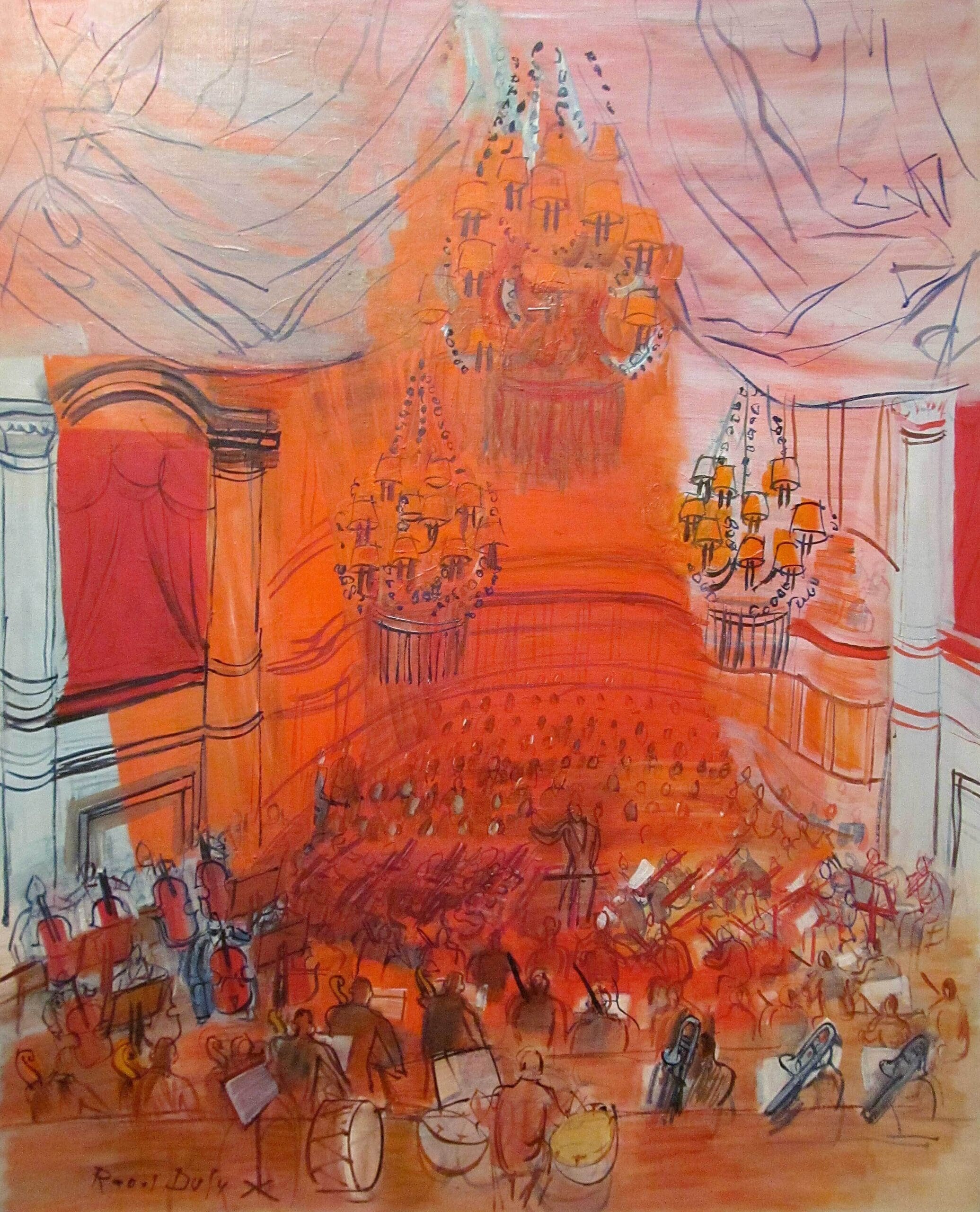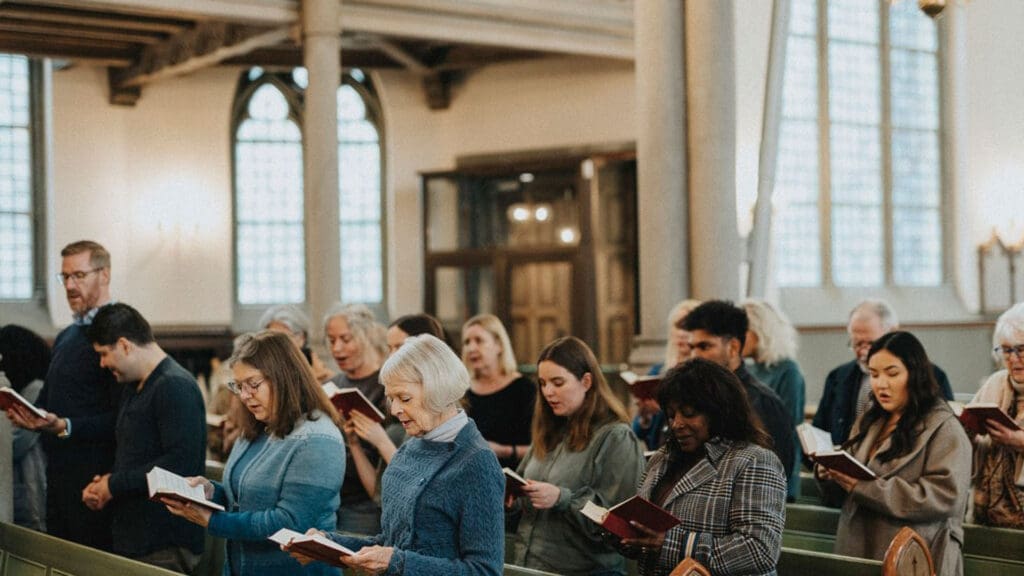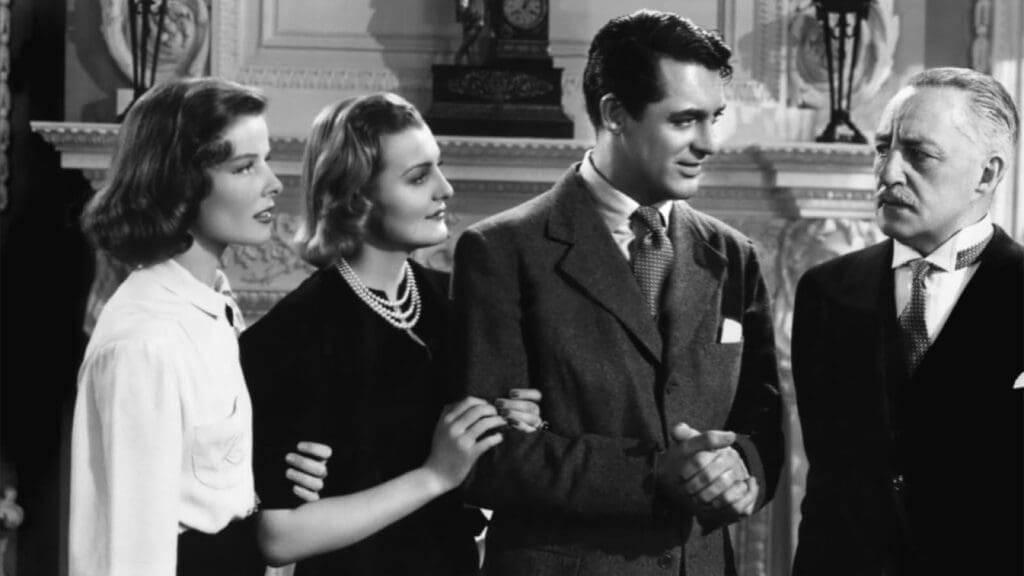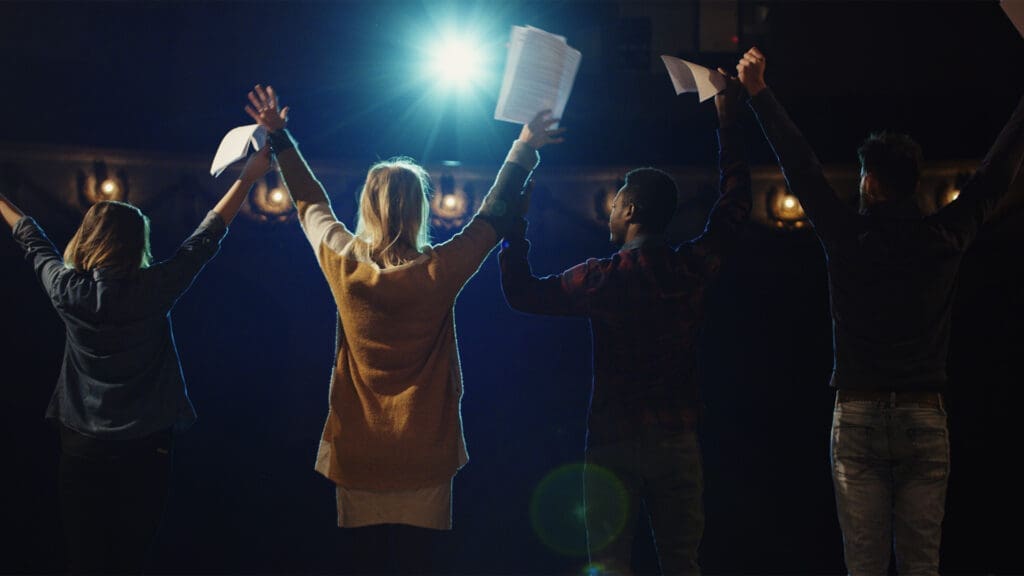I
In March of 2024, I attended a performance of Handel’s Messiah at Wheaton College that turned one of the hoariest works in the canon into something very special. Among other innovations in the performance, discussed below, the oratorio was semi-staged: the choir moved around throughout the show, into the house at times; staged dramatic tableaux; and at one point even performed a Georgian dance. All this movement was possible because the two-and-a-half-hour piece was sung entirely from memory. When the lights came up at the end of the evening, I felt I had never really heard this music before. (A recording is available here.)
The performance was billed as The Messiah Project, and was helmed by John William Trotter. John is the inaugural John and Anita Nelson Distinguished Chair of Sacred Choral Music and Conducting at the Wheaton College Conservatory of Music, and the director of the Wheaton College Concert Choir. He is also my friend and co-parishioner, and agreed to talk with me on the record about this project, its origins, and its implications, which we did, first in his office at the conservatory, and then by a fire in his backyard. What follows is an edited transcript of those conversations.

Mark Clemens: You told me The Messiah Project grew out of your frustrations with the concert music world—frustrating how?

John William Trotter: Pieces like Messiah—especially Messiah—have been so culturally formative that whole cities have founded organizations, have built architecture, so they can hear it. A large percentage of the choral societies in this country were founded specifically to perform Messiah. So now we have all these structures to enable and protect this hugely valuable thing. But then the next generation comes up into a world with those structures, so the thing that’s visible is not the transformative experience but the structure. They’re like, “Oh, a symphony hall, okay.” Another generation comes up: Now you have organizations that produce the professionals who manage and perform in these things. You go to grad school and find out how it’s done efficiently and in the smallest amount of time. And you call an artist representation company and they bring you soloists who fly in on Monday night and then there’s the piano rehearsal with the conductor on Tuesday.

MC: It becomes a system.

JWT: That’s the risk. It can become a system, a corporate structure, where quantity and efficiency are valued like in any manufacturing situation. Of course, I have experienced both beauty and profundity at concerts, and I probably wouldn’t be a musician if that weren’t so. But the more I present work now, the more I consider the experience from the audience member’s point of view: You sit down with a lot of strangers, all facing in one direction. In front of you are all the people with more money than you to buy better tickets. Then on stage you’ve got four people sitting down: those are the soloists who flew in on Monday. They’re wearing super-fancy clothes, very different from one another, and they’re completely impassive, assuring you every moment that nothing that happens behind them is of the slightest interest. And then you’ve got the conductor, who’s totally into it, but whose back is to you. So whatever’s going on there, obviously it’s not for you. Then there’s the orchestra, whose players are really preoccupied with their demanding task, and so can’t acknowledge your presence. And furthest away are the choristers, who are buried in their scores because they are really afraid their performance might not measure up to the last performance you saw. They’re packed in like sardines. And you might hear a difference between a good performance and a great one, or a really convicting, engaged, sold-out kind of performance versus a really good one. But you’d have to be an experienced concertgoer to make that distinction, and you’d be working really hard to do it. And after all that, your takeaway is, “They did an above-average job. Good for them. This is a good group.” Then you go home.
That’s a little prejudicial, but it’s not far from the experience of many seasoned concertgoers. Now, what’s the experience of unseasoned concertgoers? The beautiful dresses, the impassive soloists, the conductor with their back to you, language that takes a long time to unroll itself, that’s a little bit archaic, and is incredibly repetitive.

MC: This project is partly an invitation to those who are a little bewildered by the language, as you say, and partly an attempt to shake up the staid expectations of those who are overfamiliar with it. I’m thinking of the interludes from spoken-word artist Isis Toldson, which do both at once.

JWT: The first idea I had for the piece was her: a light comes up and standing on the podium is Isis, and she’s speaking. There’s no one else on stage except the orchestra, and then the light comes off her and then the overture starts. There was never any version of the piece for me that didn’t start that way. And because of that, the trajectory is already set in a particular direction: someone who’s alive now, using the vernacular of now to raise the questions and concerns of now that occur to us as we’re approaching this thing. There’s no way back to “We’re just trying to recapitulate what you’ve experienced before.”

MC: But what’s striking about those interludes, and other touches we’ll talk about, is they don’t undercut Handel or take you out of the piece. They kind of scour the patina of respectability off it, so you see it plain.

JWT: Late in the process, I looked up other staged Messiahs, and I saw people with massive budgets doing really complicated and often somewhat decentring productions, meaning they were asking themselves how to cut across what Handel’s doing and make it “relevant” by saying something else. I don’t want to say that’s not valuable, but it’s not what’s gonna keep me at the millstone for fourteen months. Trying to say something other than what Handel is saying?
I grew up on a farm. My parents are not culture vultures. I like the music because I like the music. I love literature. And I don’t love it because I’m a literary theorist and I’m interested in decentring the author—I love what the thing is trying to say; I’m not pursuing sophistication. Sophistication is not a positive good for me. I’m trying to be simple and direct. I say to the choir sometimes: we breathe, and then we tell the truth as best we can.

MC: Another one of those striking touches comes right after “For unto us a child is born,” during the Pifa, the “Pastoral Symphony” movement: your choir partners up to perform an eighteenth-century dance. It casts us back to Handel’s world, and we remember it is in fact a different world that we’re peeping into, through this keyhole that you’re creating for us. So there’s this wonderful exchange happening across the centuries.

JWT: One hundred percent of baroque music is dance music. Everyone from the middle class up knew the dances. We still feel the kind of intense, galvanized, rhythmic liveliness of the baroque period, but we don’t feel the actual steps because we don’t know those anymore. (And frankly, not every performance of baroque music is sold out for dance either, you know—sometimes they’re being kind of polite about it.)
It’s a country dance, right? The next movement is, “There were shepherds abiding in the field, keeping watch over their flocks by night.” So then in this movement, it’s just before night. It’s early evening, twilight. You can hear in the strings that the shepherds are not keeping watch on a thundery, freezing-cold night. They’re keeping watch on a clear, pleasant night. You know, that moment where you’re caught outside unexpectedly and you realize that there’s not that much wind and the temperature and humidity are actually quite nice and the sun is low, and you feel, despite your commitment to anxiety and ambition, this unexpected peace come over you. And you know it’s not going to be for long; this is going to pass. So you just stop and look around. This is one of the moments in the shepherd’s vocation—which is pretty rough and tough—that pays them back.
Dances are a communal expression of social order and conviviality. It’s us saying with our bodies that we are together and we’ve sorted out a way for men and women, or rich and poor, or whatever, to acknowledge our essential limitation—embodiment—and humanity in one another, and even interchange, you know, to touch, maybe.

MC: And expressing that conviviality rhythmically suggests that no matter how hapless we are, how much we mess up, it’s still possible to keep the beat. We can get it together at least that much.

JWT: And even those of us who may not be able to do that on our own can do it together.

MC: That social harmony is the messianic goal, right? That’s what he’s bringing about.

JWT: Everyone under their own vine and fig tree.

MC: And because this is a moment where the very universe is rejoicing, this is also the dance of the stars, of the heavenly spheres.

JWT: If the problem is that darkness—that is, chaos—is covering the earth, it is not intuitive that the answer is a baby. Babies introduce chaos into households as much as hope. They don’t provide solutions to the problems that they bring about or to the problems that the adults have—except the problem of despair, because they represent hope. But this baby isn’t just another person. He will be called “Wonderful, Counselor, Almighty God. . . .”

MC: The Pifa, where nobody sings, is one of a couple key lacunae in the piece. That one’s about joy. But there’s also no Passion. It’s there in a roundabout way, through prophecy and psalms, but it’s not dramatized, the way you have the shepherds in their fields.

JWT: The veil’s never torn from top to bottom.

MC: You filled that gap in a really interesting way.

JWT: I talked about dance a moment ago. Baroque dances are courtly versions of rustic dances. The court doesn’t invent anything. Where do those come from? The answer is: all over. It’s very likely those dances have influences from the whole Mediterranean basin, at a minimum. When Handel was nineteen or so he went to Venice. And in this massive shipping centre he writes Dixit Dominus, his craziest, hardest piece. Almost unperformable. It’s awesome. And I think he’s never the same again, from that experience of all these people coming from Alexandria and Tangiers and the New World, coming and going and singing to each other on the docks the stuff they’ve heard and the dances they’ve seen and trying to remember what the rhythms are [pounding a tattoo on a music stand].
I was very aware that, absent artistic choices that would cut across the assumption, this whole production could be interpreted as reasserting a kind of imperialist privilege over the new interest in folks who’ve been excluded from the canon for hundreds of years. And I did not want that, because this piece probably owes a giant and unacknowledged debt to the music of peoples all over the place through their dances. Interestingly, there’s a falling motif in African lament [sings a falling note] and in baroque music [sings a note with a similar fall, more formally]. It’s known as a “sigh motif.” You gotta wonder about that.
So a year ago we came across a Xhosa lament from South Africa, “Indodana.” We found as we developed it—as that piece developed us—that there were expressive resources in cultures that still have formalized lamenting. I started getting a suspicion that this piece had a home in Messiah, partly because of my strengthening conviction that there’s a lot of African genesis to the baroque substrate. I also felt that we needed an opportunity to stick around together before the resurrection. So at this moment, the orchestra picks up their instruments and joins the choir. By that point we understand the orchestra through their instruments. If they’re holding their instruments, they’re undone by events, including the thing they do best. They’re not gonna play their way through this.

MC: Just watching someone hold an instrument that’s not being played figures a kind of stunned silence.

JWT: It felt kind of like stripping the altar. We do it gradually.

MC: They peel away.

JWT: Yeah, exactly. And then once we did it a couple times, I’m like, I can’t be on the podium anymore. It doesn’t make sense for me to be standing there when there’s no orchestra. So in each performance, I found a different place to be so the podium would be empty too. No one’s in charge. No one knows what to do now.

MC: I have to ask about the “Hallelujah” chorus. It’s like “To be or not to be.” Everybody knows this; it’s beyond a cliché.

JWT: It’s in commercials, when the guy finds some toilet paper.

MC: How do you put life into it?

JWT: You go to the source material. When you strip away the cadenzas and the virtuosity and the last time you heard this and your favourite soloist—what are the texts, and what does Handel do with them?
In our production, you go from Isis reading people’s unanswered prayers [submitted by the audience at intermission], ending with, “Maybe he wasn’t everything they said he’d be, but he was everything that he said he’d be.” Now we’re like, oh, are you saying I substituted something else? For the words of Jesus? While we’re thinking about that, the tenor comes out: “He that dwelleth in Heaven shall laugh them to scorn; The Lord shall have them in derision,” followed by “Thou shalt break them with a rod of iron; thou shalt dash them in pieces like a potter’s vessel,” with these not at all subtle pictorial images in the orchestra of these pieces skidding across the floor, like somebody taking an iron bar and smashing pottery. “Hallelujah” is a response to that. “Hallelujah” is like, thank goodness God is going to come with an iron rod and smash things into pieces. “Hallelujah” is not “I’m going to get that thing I’ve always wanted.” “Hallelujah” is “Judgment is coming.”
In the libretto, part 3 is titled “A hymn of Thanksgiving for the final overthrow of death.” So the “Hallelujah” chorus is a hymn of mankind’s utter defeat when trying to oppose the power of the Almighty. It’s like the final defeat of our species as we define ourselves over and against God. I conduct this with an exclamation point and a question mark both in my head. I’m like, I know we need this. I know we need God to come smash everything and establish his absolute dominion over everything. I’m also aware that’s the end of me, right? I’m the thing that gets smashed. But since I can’t live without this, I’m going to rejoice in it and put myself in God’s hands and see what happens.

MC: Why do people do this at Christmas?

JWT: Well, sometimes they just do part 1. It ends with “His yoke is easy.” That passage is another kind of proof text. “Take my yoke upon you and learn from me, for . . .” For I’m a great philosopher? For I’m really strong and powerful? For I am meek and humble in heart, and you shall find rest unto your soul. From that I learn the major source of my heavy load is self-imposed desire and pride—mostly pride. Because the antidote is humility. The Lion of Judah, who made the entire freaking universe and is constantly upholding it and sustaining it, who emptied the temple, is meek and humble of heart—and that aspect of his character is the only help for my burdens.

MC: When you took this piece on the road, you performed at some unusual venues.

JWT: The last day of the tour, we did it at a prison. We were supposed to have the day off. We looked into whether we could get into the prison, which probably takes months of planning. But there was a new warden, and he was like, “Let’s do this.” So on the same day we flew out, we drove to this quite large prison and brought in our harpsichord and timpani and company of over sixty people and did some hymns and stuff and then performed almost all of Messiah for prisoners and officers. We also sang at a church that was going through a severe crisis where their pastor had been suspended for misconduct.

MC: What sort of responses did you receive, in those settings and elsewhere?

JWT: I got a lot of stories. People with stories of trauma, abuse, suicide, self-harm, tragic loss, miscarriage of justice, flat-out oppression, despair, hopelessness, doubt, disappointment. I think now that we’ve solved so many of life’s problems—tooth decay and stuff like that—we feel despair within the remaining problems, which have persisted. Whereas I think before people felt resignation. Of course terrible things are going to happen all the time because we’re all subject to the vagaries of everything. This is a vale of tears. That’s going to be the central experience of 95 percent of people. And that’s where the librettist and Handel proceed from. They don’t provide a lot of shortcuts. The way the production is designed and proportioned, there’s not a lot of rushing past uncomfortable things.
But in general? People want to tell me about their experience, or send loquacious emails, or cards, or letters on paper in envelopes. I think it’s just a part of the process. And they often say something like, “Oh, I’m sure lots of people have told you this.” And I think, so what? This is the point. You’re making your life more truthful and more real by owning whatever you think happened to you.

MC: You’ve hinted at the answer already, but how have you yourself, and your choir, responded to these performances?

JWT: We’ve come way closer to our actual responses to God in our lives through this project than many of us ever had the reason and the courage to do before, largely because we were together. It’s really hard to face the truth at the best of times, but you can do stuff together you can’t do alone. So if you’re surrounded by people whose frailties you know—like, you know none of them is Jesus, right?—who are going as far as they can, you sense the motion, the displacement that they’ve already achieved.
I have been more willing to talk to strangers about Jesus than I can ever remember being. And I feel like I have very little else to share that is nearly as important. I used to think I was really smart. Now I’ve seen just how inept I am, how little I understand, how feeble I am. So it was not talent, but just owning my longing for something better, plus a little education into where it might be found, that produced this amazing thing, that was shared and affirmed by hundreds of people over several days.
I think of the disciples after the resurrection. They don’t understand all the implications of what’s happened, they just know it means that what they hoped for before, what led them to walk away from their lives, is fully what they dimly sensed it was: the life that really is Life. You know, like all those things, the sight to the blind and freeing the demon-possessed guy in the graveyard and the storm—it all makes sense now.
So that’s what we’re on about—and every single one of them got killed for it. Which after that week I find to be such a relief, because surviving the tour and then the deluge of responses to the tour, and bringing those soloists into the project and all that—it was going to require a laying down of my life as I knew it, without trying to grab control of it again. But I don’t feel that that’s odd because the disciples all got killed for it. And I haven’t even been killed yet, you know.

MC: Say a little more about that, because a less charitable interlocutor might say, that’s kind of ridiculous—you’re comparing this to martyrdom?

JWT: So there are red martyrs and white martyrs, right? Red martyrs are the ones who are given a choice to recant or face death, and they don’t recant. And then there are white martyrs, who wake up one day and decide or are led to decide that that they’re as good as dead. And then, if they are given another morning, then they’re like, huh, how about that? I gave up my life last night. But since apparently I have a whole ’nother day, I’ll do what Jesus says today.

MC: Part of what we’re talking about is the difference between the Transfiguration and Pentecost, right? Thinking about the kind of responses you’ve been getting, I’m reminded of Peter at the Transfiguration being like, Let’s put up some tents! Let’s stay in this moment forever. It’s a sweet response, because it comes from the overflow of the heart, but it’s totally miscalibrated to the situation. It’s absurd. Two months later, he’s preaching this sermon from the rooftop, and doing miraculous things, and eventually getting himself killed. There’s a different quality of response there.

JWT: It’s funny. I’m hearing myself talk to you like, that’s strange, John’s the guy who wanted to have it both ways. I wanted to not be one of those crazy Bible-thumping weirdos. I wanted to be an erudite, impressive person who accumulated the plaudits of all, and who happened incidentally, on the down-low, to be a Christian. Have cake, eat cake, you know? And the interesting thing to me is that I don’t think I could have done this project that way. Maybe it’s just ordered loves: By the grace of God, for a period of time, I was a little bit more afraid of God than of man and was able to stick with the source material for long enough to not get all ironic, but to be real about what I don’t understand and the cultural distance I feel from the Old Testament, from Jesus’s time, from Handel’s.

MC: I can imagine a certain type of auditor of your Messiah getting hopping mad about what you did to it.

JWT: A large number of traditionalists loved it. You know, people who really know the piece well, who keep going, who find themselves wanting to go less and less. That’s the funny thing, right? Like, you keep going because . . . why? A little bit of your hope dies each time. You feel like there’s something not happening that could happen.

MC: You go because once upon a time you had an encounter, compared to which every subsequent time is a photocopy of a photocopy of a photocopy. But you’re hoping to get a glimpse of that first thrill again. I don’t know Messiah as well as a lot of people, but I had that experience too: I sat there feeling that that thing you feel when you’re in the presence of a great work and it tells you, like Rilke’s torso of Apollo, You must change your life. You’re like, oh right, that’s why I read these books that nobody cares about and listen to all this old stuff. Because sometimes this happens.

JWT: For fifteen years now I have articulated the belief that, though music does lots of things, the thing it’s for is transformation. It can help you pass the time and it can, you know, manipulate you during political ads. But I think it’s for transformation, which I distinguish from a period of time out of your reality. Transformation means you are different at the end than you were at the beginning, and possibly you will continue to be different.

MC: Even the most brilliant works, in the hands of the most sensitive and dedicated interpreters, don’t always reach that kind of transformative power. We both know this Messiah Project would be blunted after umpteen performances. It would become rote. Someone will have to come along again later and make it live again. There’s a right-place-right-time quality to that—but is there a way to be proactive, try to create suitable conditions for transformation to occur?

JWT: Andy Crouch, in Culture Making, says that cultivation is a necessary part of culture making. You don’t just make new stuff, you also cultivate that which was good that came before. I’d add that then, you curate—you present it to people in ways they can receive it. Those two things are a big part of what The Messiah Project is about. And I see that kind of sympathetic engagement with great works from the past as an irreplaceable and historically consistent part of equipping people to make work for their own time and place, including writing new music. We need to stay enough in touch with the best of the past that we can rebel against it productively. I think doing projects of old music in this way, not the photocopy of a photocopy of a photocopy, but digging into it as deeply as we’re able, is one of the best ways to help the music of the future be as meaningful and effective as Handel’s.

MC: What you’re describing is a project of evangelism, right? Whether or not you put that label on it, or whether that’s even a good label to use anymore. Which raises the question: Why is most art intended to evangelize so bad? What have you got that those people don’t have?

JWT: So, I don’t know how to do what we did. I think it’s important for me to acknowledge that I was definitely along for the ride. I didn’t go into this following a formula, and I wasn’t trying to keep to any particular path. The process of gradual understanding is still going on for me and the other participants and members of the audience. We’re still talking to each other and making connections.
Having said all that, it’s absolutely true to say that evangelism was part of the impetus of this thing. But we didn’t begin by asking, “How can we convince people to follow Jesus?” Instead, we dug into the source material: “What is this work saying? What about this do we find surprising, convicting, offensive, uncomfortable, delightful? Can we be with an audience and respond that way?” It’s much more like walking with people down a path. We’re not running ahead and saying follow us.
But I also needed to admit that I would rather mock Jesus on the cross than think seriously about why he’s up there. I would prefer to put distance between myself and the one being lynched. Maybe he has darker skin than me. Maybe he thought he was special. I just need to find something that’s true of him that isn’t true of me, so I know that’s not going to happen to me. That’s what “He trusted in God that He would deliver Him” is about. And I need to own the fact that I want all the benefits of the Judeo-Christian heritage, I want hospitals and orphanages and the weekend and every person of inestimable value, but I don’t want to have a God in the picture because he might tell me what to do.
So we looked at the piece with an orthodox lens, not trying to spiritualize it out of existence or make a metaphor of it or rationalize or relativize it, but just asking, What if this source material is correct? Then how do I really respond to that? I come back to the prison thing. Like, what if Jesus really said—and meant—if you don’t go to naked, poor, hungry, widowed, imprisoned people, you will not understand me? What if we were to live like that was actually true, which we can’t—I should say, I can’t on my own. I need a bunch of people doing that with me in order to remember it enough times in a day to not totally veer off into the ditch. Bonhoeffer says Christ in the mouth of another is stronger than Christ in your mouth. And our bunch of completely unprepared, not very holy people found that doing that with their heart, soul, mind, and bodies for several hours a day introduced us to a very unfamiliar way of life that was, surprisingly, like Kryptonite to our greatest fears. It’s mostly our fears that prevent us from taking that seriously. I talked before about our commitment to ambition and anxiety. We have made commitments in our lives. It’s not that we’re scared of commitment. We’re just scared of commitments we can’t control.

MC: What’s scariest to me is the possibility that if I do that, if I really do relinquish that control, it’ll all turn out to be true—his yoke really will be easy. I won’t want to go back to this life that, for all its problems, is at least mine.

JWT: We don’t actually want to find our vocation as humans. We don’t really want to steward creation. We just want to watch Netflix, you know? But we’re never going to be happy, fulfilled, flourishing, whatever—we’re not going to be a real Pinocchio. This is why I think we’re approximately as fearful of success as we are of failure. Failure at least is safer than success, because you don’t know where success will lead you. Failure, you have a pretty good idea.

MC: Yeah, success means things . . .
[Simultaneously] are going to change.
The kind of approach you took with Messiah, and the fruit it bore, are these only possible for the Christian interpreter of the work?

JWT: “Christian” is a funny word. I once went to see the LA Master Chorale perform Lagrime di San Pietro, a series of Italian madrigals about how sad Peter is that he denied Jesus. They staged it with choreography by Peter Sellars, who works at UCLA and is a huge deal in theatre and opera. And Sellars, in the pre-concert talk, said what I could never get away with saying at a talk like that. He said, “Being in my studio with these words and this music, I could just see how Peter is changed by Jesus. When you’re with Jesus for this long, it changes you.” So is Peter Sellars a Christian? I’ve no idea how he would answer that question. But you’ve got to wonder. This is what Jesus is saying in Matthew 25; he’s like, people think they know all about me because they go around talking about me all the time. But if you want to find me, here are six ways to do that, all of which are available to any of you at any time. If there was another way, I would describe it to you. I’m telling you where I am most obviously present in the world.

MC: Faith in action is maybe a different matter, but the insights of a piece of sacred art are accessible to, what would you say, anyone willing to pay sufficient attention?

JWT: So, I don’t know how art works. I would venture to say something like: It’s only available to those who are prepared to stand under something, rather than over it. You want to understand something, so you’re going to empty yourself, humble yourself, be in the presence of it without presenting your prior demands in advance.

MC: Maybe a better question is: Coming at this from a place of practicing faith, do you have a leg up on someone who’s not?

JWT: I wonder. A lot of the choral masterworks are Christian sacred music, and maybe you start like two inches closer to the thing, without having to find a way to spiritualize the meaning away. A lot of my students realized, in the course of this project, that they might be a whole lot less Christian than they thought they were. And of course the irony is, they’re far more Christian now, having said that, than they were before they said it. Like, in realizing the truth about yourself, you become much more real.

MC: “I believe; help my unbelief.”

JWT: So if you ask, do Christians have a leg up, I would say something like: if you’re prepared to take this journey, you’ll end up being a lot more Christian when it’s over, whether or not you described yourself as a Christian when you began.







